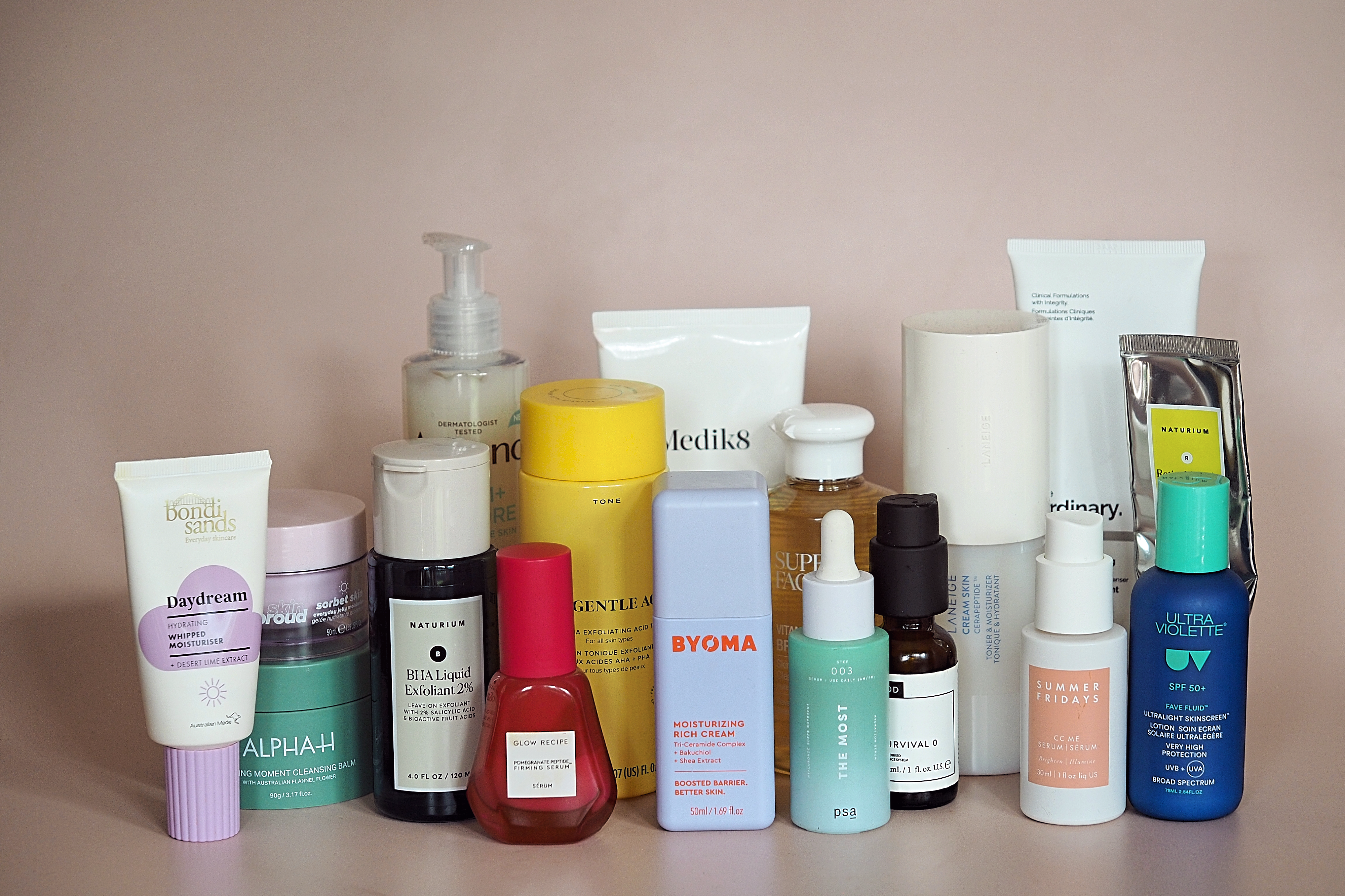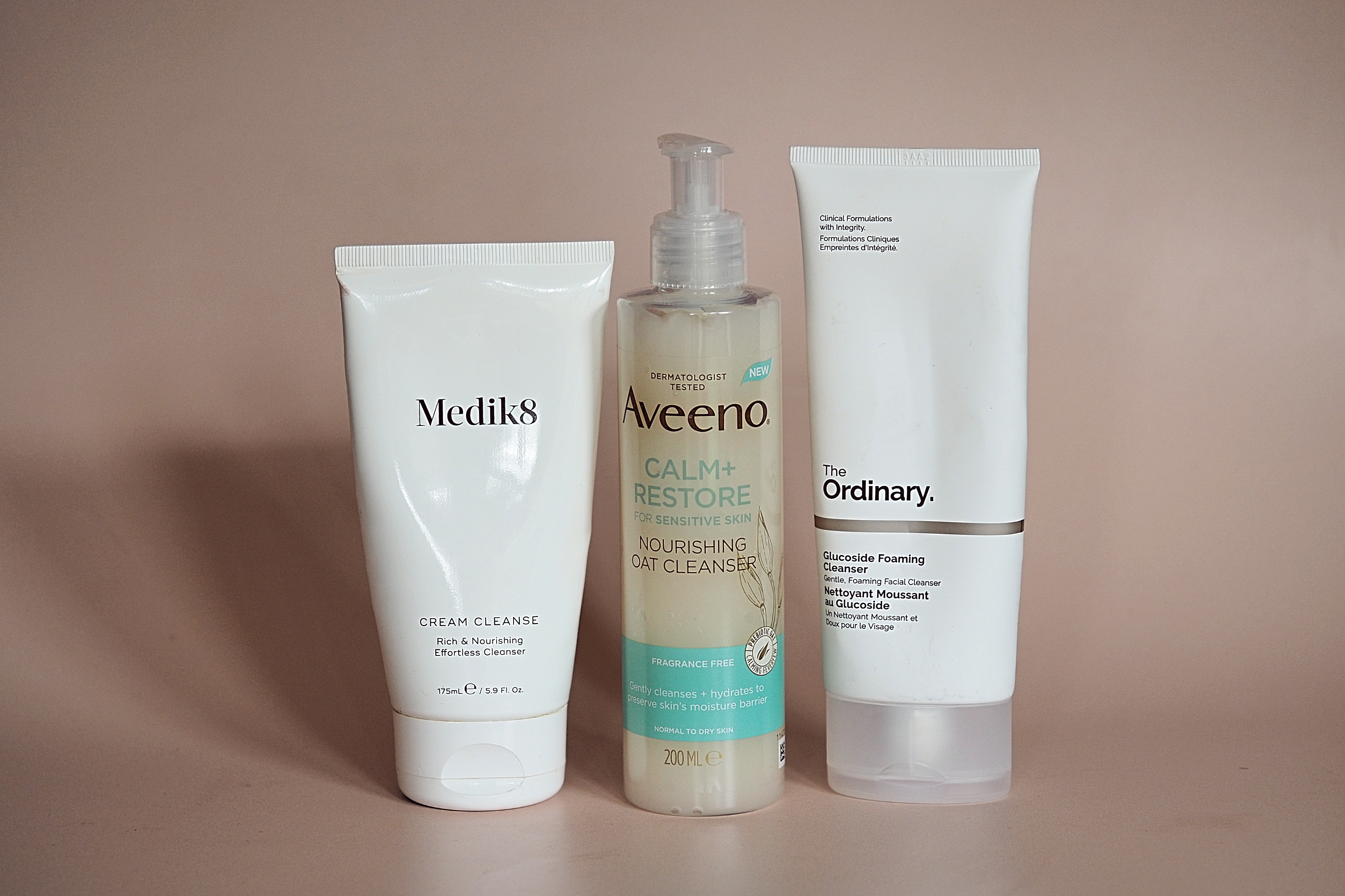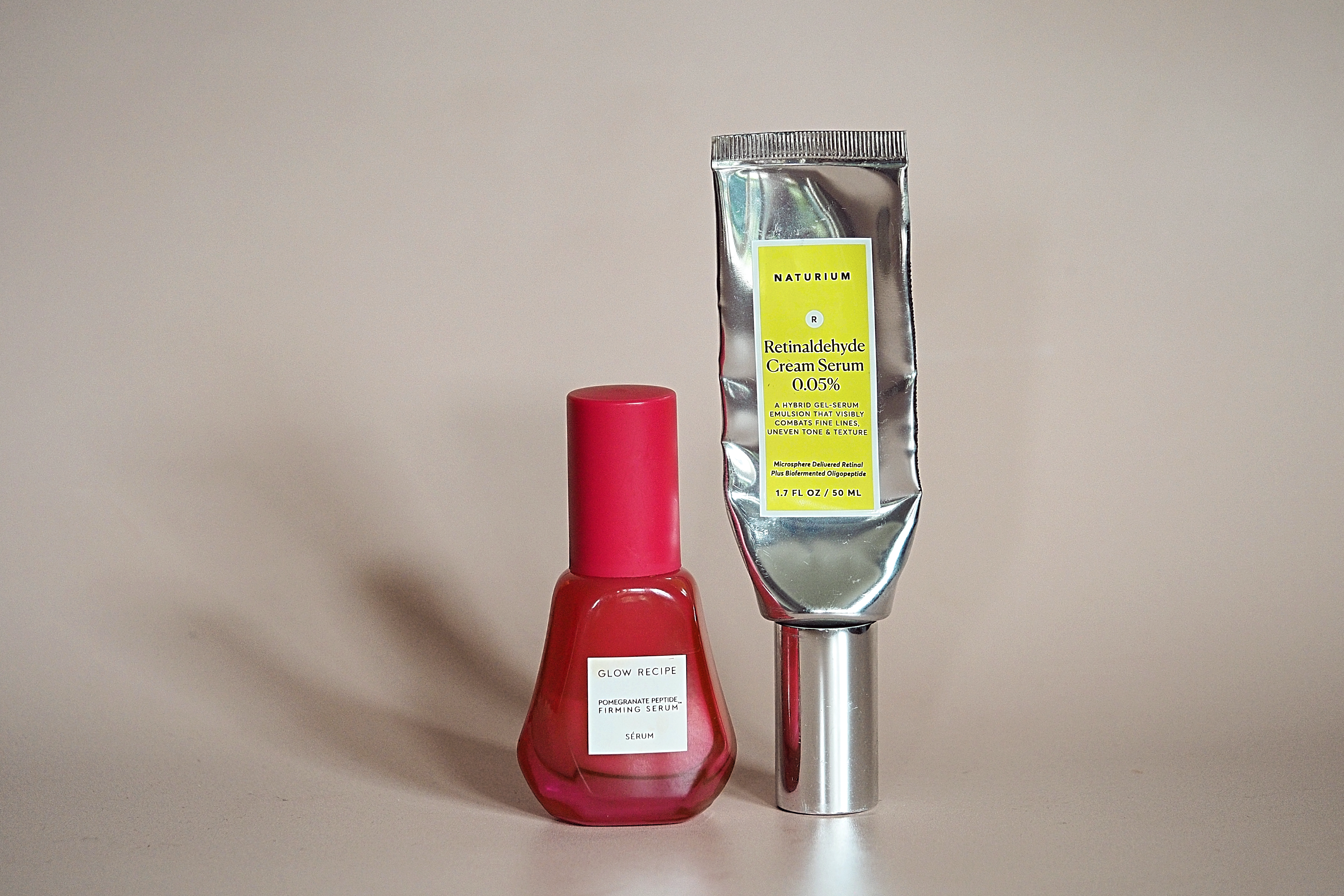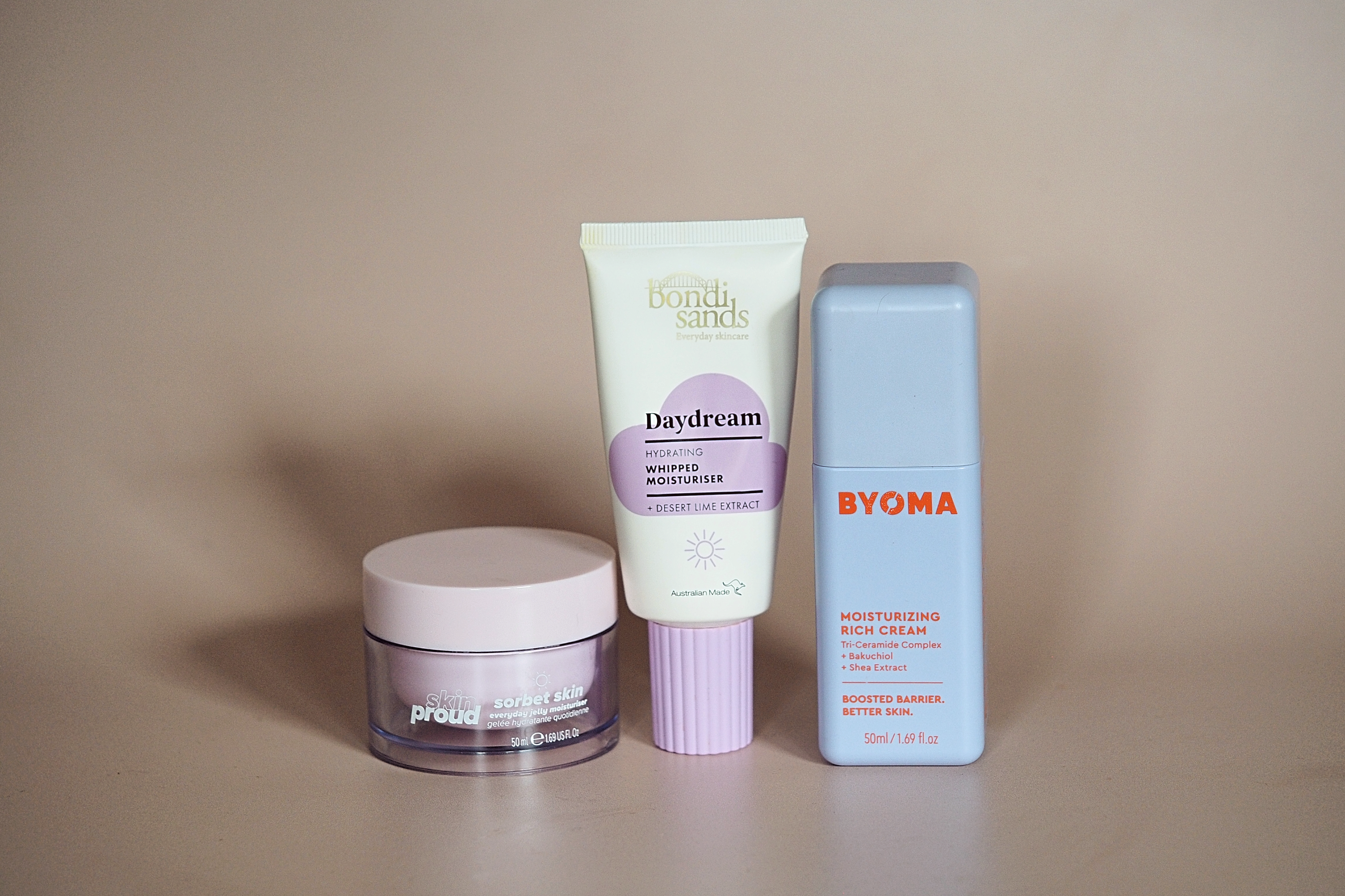Today we're going right back to basics when it comes to skincare and how to build a routine! I've tried to keep this as universal as possible but there are options in each category for different skin types, preferences and that are geared towards different skin concerns. Let's get into Skincare Routine 101...
FIRST CLEANSE (TO REMOVE MAKEUP / SUNSCREEN)
The first product category we're going to discuss are 'first cleanses' - this is a type of cleanser that's oil-based and used for removing makeup and / or sunscreen at the end of the day. They should be used as the first step in your evening routine and applied to your skin whilst it's still dry. These cleansers are almost always oil-based (we won't get into the alternatives here, given this is about 'skincare basics') and work by melting down whatever's on your skin so it can be emulsified (turned into a milk) with water. You can then remove everything with a damp face cloth or rinse the skin thoroughly with water. Typically, first cleanser products come in two forms: oils, which are liquid at room temperature and balms (sometimes referred to as butters if they have a more sorbet-like texture) that are solid at room temperature and need to be warmed between your fingertips before application.
Oil first cleanse recommendation: Super Facialist Vitamin C+ Cleansing Oil* | £12 | full review
Balm first cleanse recommendation: Alpha-H Melting Moment Cleansing Balm* | £39.99 | full review
SECOND / MORNING CLEANSE
Jelly second cleanse recommendation: Aveeno Calm & Restore Oat Cleanser* | £8.39 | full review
Foaming gel second cleanse recommendation: the Ordinary Glucoside Foaming Cleanser* | £11.10 | full review
HYDRATORS (AM AND / OR PM USE)
Hydrating toners and serums are really an option extra; not all skin will need it and others might only need the extra boost every so often or during certain times of the year. A lot of moisturisers and other, more 'active' serums that we'll come onto will also contain hydrating ingredients, so this section won't be for everyone. But, if you have skin that tends towards being dry and / or dehydrated; these products could be exactly what you need. The toner should be applied to damp (but not wet) skin right after cleansing and I recommend applying any hydrating serums after cleanser (and toner), also to slightly damp skin so humectant ingredients that attract water can pull that hydration deeper into your skin and you can seal it in with your moisturiser afterwards. These are also great formulas to have when you want to keep your skin calm and balanced; whether you're having a day off from stronger ingredients or want to use these alongside them to take the edge off.
Hydrating toner recommendation: Laneige Cream Skin CeraPeptide Toner and Moisturiser* | £29.50 | full review
Hydrating serum recommendation: PSA the Most Hyaluronic Super Nutrient Hydration Serum | £42 | full review
EXFOLIANTS (RECOMMENDED FOR PM USE)
A chemical exfoliant is the grown-up alternative to a face scrub; these are typically toners or short-contact treatments that you wash off and are considered 'active' ingredients. For the sake of ease, I'm sticking to toner products for this post. They increase skin cell turnover (which slows as we age), boost radiance and help to keep the skin nice and smooth. I personally recommend using these without anything else active, just with some hydration-boosters, if you like! You can use an exfoliating toner after cleansing 2-3 times a week and it's important to pick the right one for your skin. AHAs are great for brightening and resurfacing the skin, with glycolic acid being the most intense (and potentially irritating), lactic acid being more on the hydrating side and mandelic being both gentle and good for treating hyperpigmentation. PHAs are some of the most gentle chemical exfoliants, making them helpful for sensitive skin. Whereas BHAs are oil-soluble and can penetrate the pores to clear spot-causing debris, making them perfect for acne-prone skin. Whilst they can be used in your morning routine, given they increase sun-sensitivity by exposing fresh new skin cells, so I tend to recommend applying them in the evening.
Gentle brightening exfoliating toner recommendation: Skin Rocks the Gentle Acid* | £49 | full review
Anti-breakout exfoliating toner recommendation: Naturium BHA Liquid Exfoliant 2%* | £19 | full review
ANTIOXIDANTS (RECOMMENDED FOR AM USE)
Antioxidants protect the skin from free radical damage (emanating from our environment) and are a great pillar for everyone to have in their skincare routine; I recommend incorporating them as a serum step. This is the 'active' component of your morning routine, so your skin is protected throughout the day, and antioxidants also work synergistically with sunscreen filters so you reap the maximum benefits from both. Vitamin C is the most famous antioxidant, but most research is done on its pure form, which can be quite unstable and irritates some people's skin. Although they're not as well-studied, I recommend going with a Vitamin C derivative instead. Or there are plenty of other antioxidants on the market and serums containing extracts that are rich in antioxidants. Other than with Vitamin C, despite antioxidants being active, they're unlikely to irritate the skin and can be used daily.
Vitamin C derivative serum recommendation: Summer Fridays CC Me Serum* | £65 | full review
Alternative antioxidant serum recommendation: Niod Survival 0 Serum | £22 | full review
WELL-AGEING (RECOMMENDED FOR PM USE)
I recommend incorporating a well-ageing active into your skincare routine for nights when you're not exfoliating; retinoids are really the gold standard in this area, but peptides have some promising research too and are a little more flexible and less potentially irritating. Retinoids (Vitamin A derivatives) are the most well-studied cosmetic ingredient when it comes to not only preventing ageing but also reversing existing signs of photodamage to the skin. They can be used by anyone over 25 who is not pregnant or breastfeeding. They take some time to acclimatise to and my recommendation below is an intermediate option; check out beginner recommendations and tips for starting on retinoids here. Retinoids are not photostable so must be used in the evening. Peptides are a great, hydrating alternative for skin that can't tolerate retinoids. They could boost up collagen production like retinoids do, and they don't require your skin to adjust to them. They are safe to be used in the AM too, if you like, and should not be used alongside chemical exfoliants (products with an acidic pH can render them ineffective). Both of my recommendations are to be used as the serum step in your PM routine.
Retinoid serum recommendation: Naturium Retinaldehyde Cream Serum 0.05%* | £32 | full review
Peptide serum recommendation: Glow Recipe Pomegranate Peptide Firming Serum* | £43 | full review
MOISTURISER
Of course, we have moisturiser as part of this post! I don't want to overcomplicate things, so I'm just going to cover off the three broad textures of moisturiser and it's really up to you as to which are right for your skin and whether you want to use one in the AM, one in the PM or the same one for both. Any of these formulas can be used at any time of day, so it's really just a matter of your own textural preferences. There are gel moisturisers on the market which are usually made from humectants; that class of ingredients we discussed earlier that attract water. They tend to work best for oily skin type and / or during the summer months, though some may find they don't provide enough lasting hydration or don't have enough of a 'sealing' property to trap in hydration. We then have the basic lotion moisturiser that will work for most skin types and can be easily and readily absorbed by most people's skin without feeling heavy. Then, we have a richer cream that dry skin will enjoy but that may still work for other skin types as a reparative overnight moisturiser.
Gel moisturiser recommendation: Skin Proud Sorbet Skin Jelly Moisturiser* | £13.99 | full review
Lotion moisturiser recommendation: Bondi Sands Daydream Whipped Moisturiser* | £9.99 | full review
Rich moisturiser recommendation: Byoma Moisturising Rich Cream* | £13.99 | full review
SUNSCREEN
Sunscreen is obviously the final piece of the skincare basics puzzle! A lot of active skincare ingredients can make your skin a little more sensitive to the sun, and obviously prevention is better than cure, so the more you can preserve the skin you have, the less 'work' you have to do to reverse damage caused. I personally recommend investing in an everyday all-rounder that's going to be lightweight, easy to apply and reapply (without any cast) and work just as well under makeup as it holds up on a hot day. The easier it slots into your lifestyle, the more likely it is that you're going to actually use it! I recommend a broad-spectrum SPF 50+ (though SPF 30 will be fine during the winter) to protect the skin from both UVA and UVB rays and to accommodate for the fact that most of us aren't quite applying enough or reapplying as often as we should...
All-rounder sunscreen recommendation: Ultra Violette Fave Fluid Ultralight Skinscreen SPF 50+* | £37 | full review
What are the building blocks of your skincare routine?











No comments
Post a Comment
Thank you for your comment - I read and appreciate every single one :)
There's no need to spam - I will check out your blog if you leave a click-able link under a genuine comment!
If you have a question please check back for my reply or tweet me @jasminetalksblg
xx